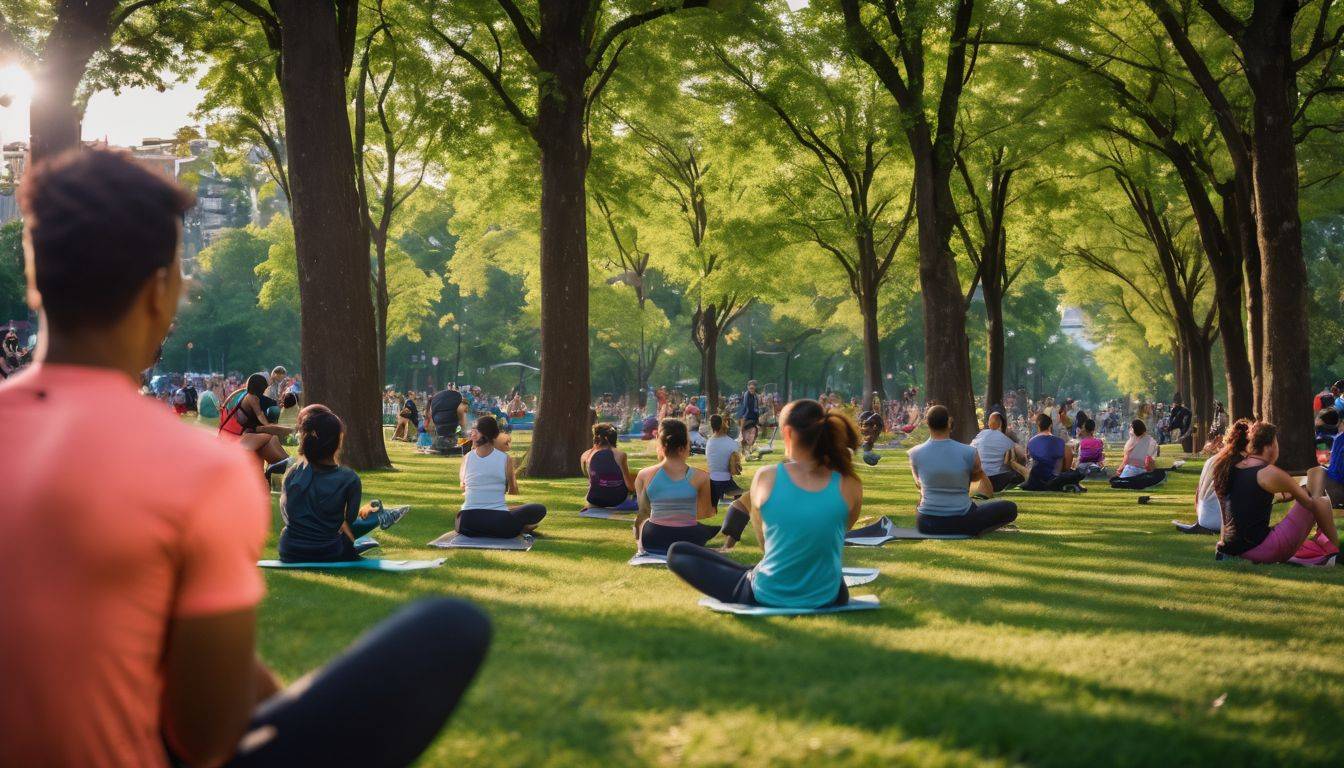Discover Life-Changing Secrets for a Healthy City Lifestyle

Living in a city can be a challenge when trying to maintain a healthy lifestyle. With fast-paced lives and minimal access to nature, urban living might seem incompatible with wellness goals.
This article will guide you through practical steps that transform these challenges into opportunities for promoting health and well-being despite the concrete jungle around you. Are you ready to redefine your view of city living?.
Key Takeaways
- Take the stairs instead of the elevator to boost physical fitness and burn calories.
- Use alternative modes of transportation like biking or walking to stay active and improve cardiovascular health.
- Create a home gym with minimal equipment to maintain an active lifestyle without leaving your residence.
- Prioritize choosing fresh fruits and vegetables, finding local farmers markets, and avoiding fast food and processed foods for a healthy diet in the city.
- Seek out healthcare professionals in your area for regular check – ups and preventive care.
- Manage stress and mental health through self-care strategies like exercise, healthy eating, seeking help if needed, and engaging in nature-based activities.
- Improve air quality in the city by using air purifiers or indoor plants to filter out pollutants.
Staying Active in the City

To stay active in the city, take the stairs instead of the elevator and use alternative modes of transportation such as biking or walking.
Taking the stairs instead of the elevator

Switching from the elevator to the stairs drastically boosts physical fitness. This cardiovascular exercise presents individuals with a chance to seamlessly integrate daily activity into their lives, especially for those living in urban environments.
Climbing stairs burns more calories per minute than jogging or swimming, making it an efficient approach to weight management. Not only does this active lifestyle help maintain a healthy weight, but it also enhances brain function.
People who climb stairs experience increased mental vigor and sharper cognition due to improved blood flow. Shunning sedentary behavior like riding elevators cultivates such beneficial healthy habits and makes city-living significantly healthier and more active!
Using alternative modes of transportation (biking, walking)

Communities around the world are discovering more sustainable transportation solutions that not only reduce carbon emissions but also support a healthy, active lifestyle. Two popular forms of nonmotorized, green transportation include biking and walking.
They offer an enjoyable way to commute while simultaneously contributing to your daily exercise routine.
Cycling is renowned for its abundance of health benefits. It strengthens muscles, bolsters cardiovascular health and guards against numerous serious diseases like stroke, heart attack, cancers, depression, diabetes and obesity.
As you pedal through city streets or along bike paths in pedestrian-friendly areas, you’re not just moving from point A to B; you’re also enhancing your mental wellbeing.
Switching gears slightly – brisk walks can have significant impacts on fitness levels as well! Walking helps trim waistlines and lowers risks of chronic diseases including arthritis.
It even serves as a crucial component in ‘last mile’ stages of travel; connecting people with public transit hubs efficiently.
Adopting these modes of urban mobility sets the stage for both personal growth and environmental preservation. The streets become your personal gym—and there’s no membership fee required!
Creating a home gym

Creating a home gym can provide an ideal solution for city dwellers looking to lead an active lifestyle without stepping out of their residence. Often, the bustling nature and limited outdoor spaces in urban environments pose hurdles to maintaining regular fitness routines.
Therefore, having your own workout space at home fills that gap effectively.
You don’t necessarily need a vast area or expensive equipment to set up a functional home gym. A small corner of your living room or bedroom with essential gear like dumbbells, resistance bands, and yoga mats can suffice for most workouts.
If you have more space available, consider adding cardio machines such as a treadmill or stationary bike. This setup encourages adherence to exercise schedules while saving commuting time to training facilities outside the house.
Choosing Healthy Foods in the City

When living in a city, it is important to prioritize choosing healthy foods by eating fresh fruits and vegetables, finding local farmers markets or organic stores, and avoiding fast food and processed foods.
Eating fresh fruits and vegetables

Eating fresh fruits and vegetables is a crucial component of maintaining a healthy lifestyle, especially for those living in cities. These nutrient-rich foods provide essential vitamins, minerals, and fiber that our bodies need to function optimally.
Incorporating a variety of colorful fruits and vegetables into our diets not only supports weight management but also reduces the risk of chronic diseases like heart disease, diabetes, and certain types of cancer.
Additionally, consuming these nutritious foods can improve digestion, boost energy levels, and enhance overall well-being. By following dietary guidelines that emphasize whole, minimally processed foods such as fruits and vegetables, we can take an important step towards achieving balance and nourishing our bodies effectively.
Finding local farmers markets or organic stores

Support local farmers and businesses while making healthier food choices by finding local farmers markets or organic stores. Buying locally grown foods has multiple benefits, including supporting the local economy, promoting sustainable farming practices, and ensuring access to fresh, flavorful, and safe food options. Look for farmers markets in your area that offer a variety of locally sourced fruits, vegetables, and other products. Explore organic stores that prioritize environmentally friendly and ethical farming practices. By choosing locally grown and organic foods, you can contribute to a healthy lifestyle while supporting your community.
Avoiding fast food and processed foods

Choosing nutritious meals is crucial for maintaining a healthy lifestyle in the city. By avoiding fast food and processed foods, you can reduce the risk of premature death and prevent various health problems.
Instead, focus on whole foods with fresh ingredients to create a balanced diet. Look for organic options and locally sourced produce at farmers markets or organic stores. By cooking homemade meals using natural ingredients, you can ensure that you’re nourishing your body with nutrient-rich foods.
Opting for a plant-based diet is another great way to prioritize clean eating and improve your overall health. Remember, what you put into your body has a direct impact on your well-being.
Managing Your Health in the City

Prioritize regular exercise and physical activity. Seek out healthcare professionals in your area. Manage stress and mental health effectively. Read on to discover more tips for maintaining a healthy lifestyle in the city.
Prioritizing regular exercise and physical activity

Regular exercise and physical activity should be a top priority when it comes to maintaining a healthy lifestyle, especially for those living in the city. Engaging in regular physical activity is crucial for improving overall heart health and reducing the risk of heart disease.
It can also help prevent and manage noncommunicable diseases such as diabetes, stroke, and cancer. Despite the common barrier of lack of time, finding ways to incorporate exercise into your daily routine is essential.
Whether it’s going for a brisk walk during lunch breaks or joining fitness classes after work, making an effort to prioritize physical activity will have long-lasting benefits for your health and well-being.
Seeking out healthcare professionals in the area

Accessing quality healthcare is crucial for maintaining a healthy lifestyle in the city. Here are some steps you can take:
- Connect with local medical providers: Establishing a relationship with primary care doctors and healthcare practitioners in your area is essential for regular check-ups, preventive care, and addressing any health concerns that may arise.
- Seek out health specialists: Depending on your specific needs, you may need to consult with health experts such as dermatologists, cardiologists, or nutritionists. Look for specialists who specialize in the areas that are relevant to your health goals.
- Utilize healthcare resources: Take advantage of community health programs and resources offered by public health workers and healthcare personnel. These programs can provide valuable information and services to help you maintain optimal health.
- Explore alternative medicine options: If you’re interested in complementary or alternative medicine approaches, consider seeking out healthcare professionals who specialize in these practices. They can offer guidance on incorporating holistic treatments into your wellness routine.
Managing stress and mental health

Urban living can bring about increased levels of stress and mental health challenges. Research has shown that urbanites are more likely to have anxiety disorders compared to those in rural areas.
It is also common for city dwellers to experience other mental health issues such as posttraumatic stress disorder, distress, anger, and paranoia. To manage stress and maintain good mental health in the city, it is important to be aware of your well-being and take time to relax when feeling stressed.
Engaging in physical activity, maintaining a healthy diet, and seeking help from a mental health provider if needed can all contribute to reducing stress and improving overall mental well-being.
Improving Air Quality in the City

To improve air quality in the city, consider using air purifiers or indoor plants to filter out pollutants and chemicals.
Understanding the impact of air pollution on health

Air pollution in cities is a major threat to our health. One third of deaths from stroke, lung cancer, and heart disease are caused by air pollution. Breathing in high levels of pollutants can increase the risk of respiratory infections, heart disease, and stroke.
It’s important to be aware that air pollution is linked to diseases and can cause damage to our bodies. Not only does it have serious social and economic consequences, but it also contributes to global warming and climate change.
Taking steps to improve air quality in the city can help protect our health and well-being.
Using air purifiers or indoor plants

Air purifiers and indoor plants are effective ways to improve the air quality in your city home. They can reduce indoor pollution concentrations, filter out allergens, and create a healthier living environment. Consider these options for cleaner air:
- Invest in an air purifier with filtration systems that can remove pollutants from the air.
- Add indoor plants, like larger and leafier varieties, which act as natural air purifiers.
- Regularly vacuum your home to decrease allergens and improve indoor air quality, especially during winter months.
Getting outdoors in green spaces for fresh air
Spending time outdoors in green spaces is essential for maintaining a healthy lifestyle, especially when living in a city. These natural environments offer more than just fresh air; they provide opportunities for outdoor recreation and nature therapy.
Research shows that being outside in green spaces can reduce stress, improve mood, and enhance mental wellbeing. In addition, urban green spaces help to improve air quality by absorbing carbon dioxide and reducing pollution levels.
So make time to explore public parks or find nearby areas with trees and plants – not only will it benefit your physical health but also contribute to a sustainable and environmentally conscious way of living in the urban environment.
Expert Q&A: Tips and Advice for a Healthy Lifestyle in the City

Experts share their insights on maintaining a healthy lifestyle in urban environments, offering valuable tips and advice for finding balance and staying healthy while living in a city.
Health experts provide insights on maintaining health in urban environments
Experts who specialize in healthy living in urban environments offer valuable insights on how to maintain good health amidst the hustle and bustle of city life. These experts emphasize the importance of access to nutritious food and engaging in regular physical activity.
They also highlight the need for managing stress and mental health, as well as being aware of the impact of air pollution on our wellbeing. By following their guidance, individuals can navigate the challenges that come with urban living while prioritizing their overall health and vitality.
Tips for finding balance and staying healthy while living in a city
Maintaining a balanced and healthy lifestyle while living in a city can be challenging, but it is definitely possible. Start by prioritizing regular physical activity and making small changes to incorporate movement into your daily routine.
Take the stairs instead of the elevator, or opt for biking or walking as alternative modes of transportation whenever possible. Additionally, create a home gym with simple equipment to make exercise convenient and accessible.
When it comes to food choices, focus on eating fresh fruits and vegetables, and seek out local farmers markets or organic stores for healthier options. Avoid fast food and processed foods that are high in fat, sugar, and salt.
Remember that managing your health also involves taking care of your mental well-being; find ways to manage stress through activities like meditation or pursuing hobbies you enjoy.
Lastly, don’t forget about air quality – understand the impact of air pollution on health, use air purifiers or indoor plants to improve indoor air quality, and take advantage of green spaces in the city for fresh air when possible.
Conclusion

Achieving a healthy lifestyle while living in a city may seem challenging, but it is definitely possible. By prioritizing regular exercise, choosing healthy foods, managing your health, and improving air quality, you can create a balanced and sustainable lifestyle.
Remember to make conscious choices and take advantage of the resources available in urban environments to promote your overall well-being.
FAQs
1. Is it possible to lead a healthy lifestyle while living in a city?
Yes, it is possible to lead a healthy lifestyle while living in a city by prioritizing regular exercise, maintaining a balanced diet, and managing stress levels.
2. How can I incorporate exercise into my daily routine in the city?
You can incorporate exercise into your daily routine in the city by taking advantage of parks or green spaces for walks or jogs, using stairs instead of elevators when possible, and joining fitness classes or gyms located nearby.
3. What are some tips for maintaining a balanced diet while living in a city?
To maintain a balanced diet while living in a city, try meal prepping at home to avoid relying on fast food options, choose whole foods over processed ones, and make an effort to include fruits and vegetables in your meals.
4. How can I manage stress levels while living in a busy urban environment?
Managing stress levels while living in the city can be achieved through practices such as meditation or mindfulness exercises, engaging in hobbies that bring joy and relaxation, and seeking support from friends or professionals if needed.
*** More great articles that may be of interest to you 🙂
https://www.greatertorontohomepros.com/blog/improve-your-health-in-the-city/



